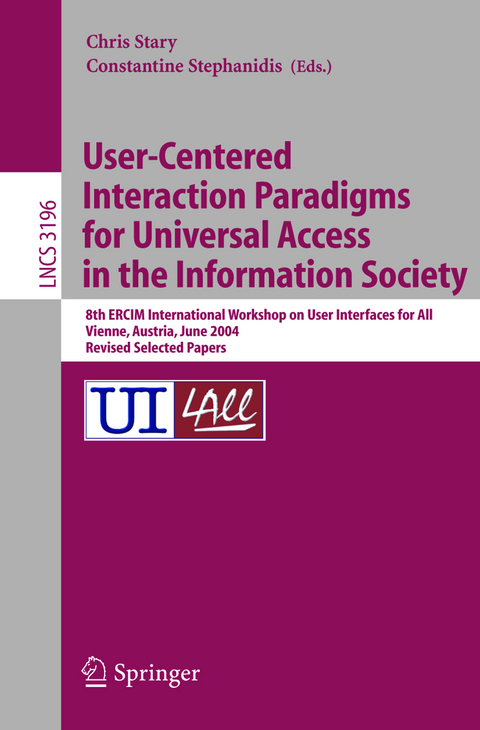
User-Centered Interaction Paradigms for Universal Access in the Information Society
Springer Berlin (Verlag)
978-3-540-23375-6 (ISBN)
O. Univ.-Prof. Dipl.-Ing. Dr. Christian Stary ist Leiter des Instituts für Wirtschaftsinformatik Communications Engineering sowie des Kompetenzzentrum Wissensmanagement an der Sozial- und Wirtschaftswissenschaftlichen Fakultät der Universität Linz. Er ist ausgebildeter Informatiker der TU Wien und war mehrere Jahre in der Privatwirtschaft tätig. Er promovierte 1988 und habilitierte sich 1993 an der TU Wien auf dem Gebiet des Usability Engineering. Darüber hinaus war er an unterschiedlichen Universitäten in den Vereinigten Staaten, Deutschland und Österreich als Assistant bzw. Associate Professor oder Gastprofessor tätig, ehe er 1995 an die Universität Linz berufen wurde. Im Rahmen der Forschung betreut er die Schwerpunkte Advanced Distributed Learning, Organisational Learning und Adaptive Systems.
Implementing User Diversity.- Universal Access Through Client-Centred Cognitive Assessment and Personality Profiling.- A Study of Web-Based Information Needs of Senior Citizens in Singapore.- Strategies for Finding Government Information by Older People.- Towards Universal Access Through Automated Assessment of Defined Clinical Populations.- Sc@ut: Platform for Communication in Ubiquitous and Adaptive Environments Applied for Children with Autism.- A Question of Realism.- Individual Differences and Behavioral Aspects Involved in Modeling Web Navigation.- Enabling Access to Computers for People with Poor Reading Skills.- Adaptation and Personalisation.- Personalisation Meets Accessibility: Towards the Design of Individual User Interfaces for All.- Interfacing the Interface: Unification Through Separation.- Learning Usage Patterns for Personalized Information Access in e-Commerce.- Adaptive User Modelling in AthosMail.- A Personalised Interface for Web Directories Based on Cognitive Styles.- Framework for User Interface Adaptation.- Interface Tailoring for Mobile Computing Devices.- Accessibility and Usability of Interactive Applications and e-Services.- Towards Guidelines for Usability of e-Learning Applications.- An Empirical Methodology for Usability Analysis of a Touchscreen-Based Information Kiosk System for African Users with Low Levels of Computer Literacy.- Using Automatic Tools in Accessibility and Usability Assurance Processes.- Accessibility in the Field of Education.- Supporting Web Usability for Vision Impaired Users.- Disability as a Vehicle for Identifying Hidden Aspects of Human Activity: Inclusive Design and Dyslexia in Educational Software Development.- Designing Web-Applications for Mobile Computers: Experiences with Applications to Medicine.- EmpiricalPerformance Analysis of Web Accessibility in Ubiquitous Information Network.- Designing and Implementing a Paradigm of Interactive and Communicative Cultural Playspaces in an On-Line Language Learning Program.- Universal Access and Design for All: Guidelines, Standards and Practice.- User Needs and e-Government Accessibility: The Future Impact of WCAG 2.0.- Inclusive Design in Industry: Barriers, Drivers and the Business Case.- The Role of Working Memory and Long Term Memory in Deaf Users' Hypertext Navigation: Review of Guidelines for Web Accessibility.- The Role of the Trust Intermediary in the Information and Knowledge Society.- Developing BS7000 Part 6 - Guide to Managing Inclusive Design.- Investigating the Inclusivity of Digital Television Set-Top Boxes.- Methodological Approaches to Identify Honorable Best Practice in Barrier-Free Web Design.- Novel Interaction Techniques, Devices and Metaphors.- A Supportive Multimodal Mobile Robot for the Home.- Multimodal Interaction in Architectural Design Applications.- Audio Rendering of Mathematical Formulae Using MathML and AudioMath.- A Comparison of Prediction Techniques to Enhance the Communication Rate.- A Framework for Context-Sensitive Coordination of Human Interruptions in Human-Computer Interaction.- A Method to Extend Functionality of Pointer Input Devices.- A New Visualization Concept for Navigation Systems.- Haptic and Spatial Audio Based Navigation of Visually Impaired Users in Virtual Environment Using Low Cost Devices.- Data Entry on the Move: An Examination of Nomadic Speech-Based Text Entry.- Whistling User Interface (U3I).- Use of Force Feedback Pointing Devices for Blind Users.
| Erscheint lt. Verlag | 30.9.2004 |
|---|---|
| Reihe/Serie | Lecture Notes in Computer Science |
| Zusatzinfo | XII, 488 p. |
| Verlagsort | Berlin |
| Sprache | englisch |
| Maße | 155 x 235 mm |
| Gewicht | 780 g |
| Themenwelt | Mathematik / Informatik ► Informatik ► Betriebssysteme / Server |
| Informatik ► Software Entwicklung ► User Interfaces (HCI) | |
| Schlagworte | Adaptive Interfaces • Assistive Technology • Benutzeroberfläche • Benutzeroberfläche / GUI • design for all • E-Services • Hardcover, Softcover / Informatik, EDV/Betriebssysteme, Benutzeroberflächen • HC/Informatik, EDV/Betriebssysteme, Benutzeroberflächen • HC/Informatik, EDV/Informatik • Human-Computer interaction • Informationsgesellschaft • Information Society • Intelligent interfaces • interactive applications • Mensch-Computer-Kommunikation • Modeling • Performance • personalization • Rendering • robot • Trust • Universal Access • user-centered systems • User Interfaces • Visualization |
| ISBN-10 | 3-540-23375-X / 354023375X |
| ISBN-13 | 978-3-540-23375-6 / 9783540233756 |
| Zustand | Neuware |
| Haben Sie eine Frage zum Produkt? |
aus dem Bereich


